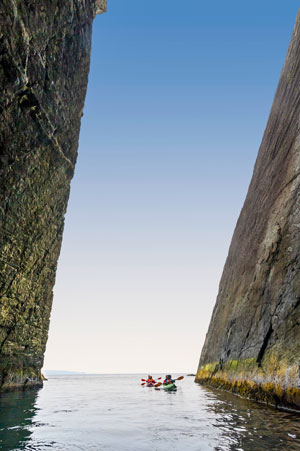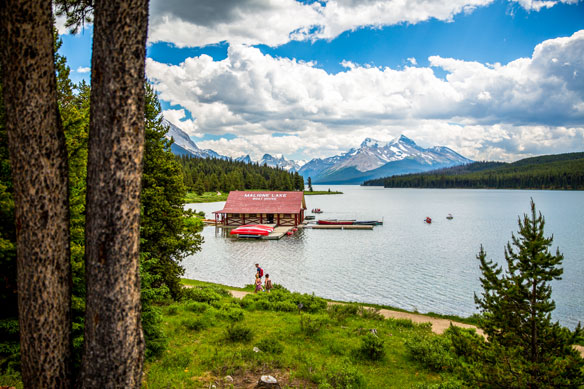
Making the pivot
A conversation with David Robinson, Interim President and CEO, Vice-President, Strategy and Stakeholder Relations, Destination Canada

BOB MOWAT
This week, Canadian Travel Press talks with Destination Canada’s David Robinson about how this country’s tourism marketing organization is working with its partners to sell Canada to Canadians.
Can you start by talking about Destination Canada’s mandated role before COVID-19 and how the organization has adapted to the current situation?
Destination Canada’s mandate involves supporting the visitor economy by producing regular data, market intelligence and industry analysis to help businesses market to international travellers, so we can grow Canada’s tourism sector.

Robinson
Tourism plays a significant role in the national economy – for example, last year it generated an estimated $104.9 billion in tourism expenditures, supporting approximately 1 in 10 jobs in communities across Canada and contributing an estimated $43.5 billion in Gross Domestic Product.
Our mandate as a result of COVID-19 hasn’t changed, however we’ve pivoted to focus on marketing domestic travel to Canadians, to make sure we can continue to support Canada’s tourism sector.
It will take a collective effort across the industry to help generate recovery momentum. We are collaborating with our industry partners to support a timely recovery and strengthen our ability to build demand for the fall, winter and beyond.
As part of this collaborative approach, we recently announced – https://www.destinationcanada.com/en/news/destination-canadas-unprecedented-partnership-provinces-gives-canadian-communities-lift-they-need – that Destination Canada will invest $30 million with Provincial and Territorial Marketing Organizations to support the recovery of communities. This initiative will be rolled out over 18 months and each province or territory, at their own time, will assess the best distribution of funds, taking into account local and regional COVID-19 circumstances, infrastructure in place to safely host visitors, and the willingness of communities to welcome travellers back, among other factors.
To support our domestic marketing efforts, we are crowdsourcing hyper-local content that celebrates the diverse people and places that make Canada special, and in particular, what makes communities distinct. Content, conversation and engagement that is generated at a hyper-local level will help build pride in the theme and become a springboard for eventual national and international campaigns – when conditions permit.
What are the factors or indicators that guide Destination Canada and the organization’s focus?
Destination Canada regularly provides intelligence, tools and insights to our partners – equipping them to optimize their business and maximize their reach. As a result of COVID-19, this work is needed more than ever. We are taking a phased approach of Response, Recovery and Resilience and our COVID-19 Research is informing each of these phases.
 We know that research is required to guide our collective response so we can make evidence-based decisions. One of the realities we are all facing is that there is no set timeline – and the return to “travel in Canada” will look different across the country. It is important to also know that recovery efforts are about not only reaching local tourists, but also making sure communities are ready to welcome them back (and feel safe in doing so). We are conducting weekly analysis of each region’s travel restrictions and local residents’ sentiment – https://www.destinationcanada.com/en/coronavirus-updates/covid-19-research#canadianresidentsentiment – towards tourists and advertising tourism – this is helping us make informed decisions when it comes to marketing.
We know that research is required to guide our collective response so we can make evidence-based decisions. One of the realities we are all facing is that there is no set timeline – and the return to “travel in Canada” will look different across the country. It is important to also know that recovery efforts are about not only reaching local tourists, but also making sure communities are ready to welcome them back (and feel safe in doing so). We are conducting weekly analysis of each region’s travel restrictions and local residents’ sentiment – https://www.destinationcanada.com/en/coronavirus-updates/covid-19-research#canadianresidentsentiment – towards tourists and advertising tourism – this is helping us make informed decisions when it comes to marketing.
To learn more about Destination Canada’s phased approach and view our latest research reports, visit https://www.destinationcanada.com/en/coronavirus-updates#destinationcanadaupdates.
Do you see consumers having an appetite for domestic travel, and what factors might impact their decision to travel or stay at home?
We anticipate that there will be an increase in domestic travel within Canada given that Canadians are unlikely to be able to undertake international holidays in 2020. Canadians traditionally have spent significantly abroad ($36B). If we capture 60% of the Canadian spend abroad, we will have made up our loss of international travel to Canada. Given the value that Canadians place on travel experiences, this presents an opportunity to stimulate Canada’s visitor economy.
We also know that two of the factors travellers are reporting as most important to them are safety and flexibility. For Canadians that are eager to hit the road this summer, we have created an Interactive Map – https://caen-keepexploring.canada.travel/canada-nice?_ga=2.42785893.1142764255.1594078453-1973099969.1579545610#canadamap – that shows current travel restrictions and safe travel requirements by province and territory. Additionally, we have created 10 tips for Canadians – https://caen-keepexploring.canada.travel/things-to-do/guide-to-travelling-canada-safely-this-summer – to keep in mind as they plan their travel.
For Canadians who are looking for assistance navigating the new travel landscape, travel advisors can help them decide what is safe to do, and provide travelers with the security that their vacation plans can be managed professionally by a certified agent
How is Destination Canada involving travel advisors in this process of selling domestic travel?
Destination Canada has a history of working with travel advisors in our international markets, helping them sell Canadian experiences to inbound travellers. As a result, we have been able to pivot quickly to capture valuable training resources and share this knowledge with domestic travel advisors, who may not be as familiar with selling Canada to their clients.
The Canada Specialist Program – https://www.destinationcanada.com/en/canada-specialist-program-domestic?utm_source=canadaspecialist.ca&utm_medium=vanity_url&utm_campaign=ca%7ccampaign%7cdc%7cna%7c2020-q2&utm_content=canada+specialist+program+domestic_ – includes a series of webinars with destination experts from each of Canada’s provinces and territories, as well as our national partners Indigenous Tourism Association of Canada – https://indigenoustourism.ca/ – and Parks Canada – https://www.pc.gc.ca/en/index . Webinars have been designed to provide travel advisors with an orientation to the unique geography, history, and cultural significance of each destination, in addition to informative details on how to help clients navigate the destination in a meaningful and memorable way.
There are currently seven episodes available on our website (Nova Scotia, Quebec, Manitoba, Prince Edward Island, Saskatchewan, New Brunswick and Newfoundland & Labrador). New webinars in the series will be published throughout the month of July, and all webinars are available in English and French.
For more details, including a schedule of webinars, visit: www.canadaspecialist.ca (English) or www.specialisteducanada.ca (French). Indigenous Tourism Association of Canada – https://indigenoustourism.ca/ – has also developed a site dedicated to highlighting bookable market-ready Indigenous experiences.
Last question. What do you see as being the ‘halo effect’ of domestic marketing for Canada?
It’s important to remember one of the most powerful influencers on travel decisions is recommendations from friends and family. With an unprecedented number of Canadians travelling domestically, there will be a greater volume of travellers sharing their travel highlights and booking recommendations. Conversation and engagement that is generated at a hyper-local level will help build pride with Canadians. This kind of advocacy has the potential for long-term impact and will change how Canadians see and value their own country for holiday and business travel in the future.
Destination Canada is proud to be investing in community-based tourism that will enrich what we have to offer as a country while spreading the benefits of a visitor economy to more Canadians. Nuanced, thoughtful, community-based tourism lifts up culture, art, community confidence and pride, and ultimately, innovation.

